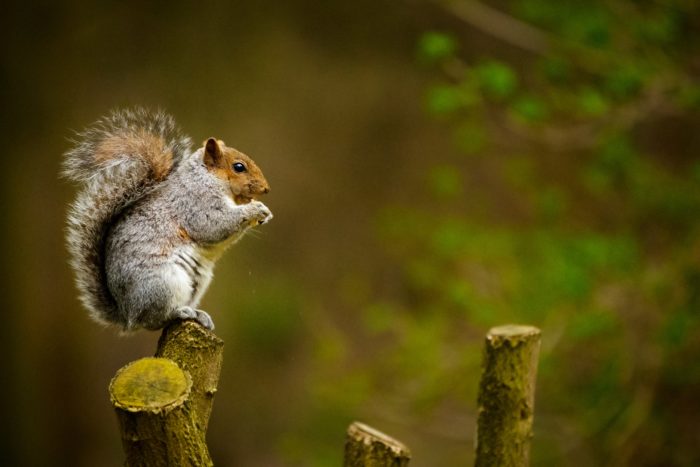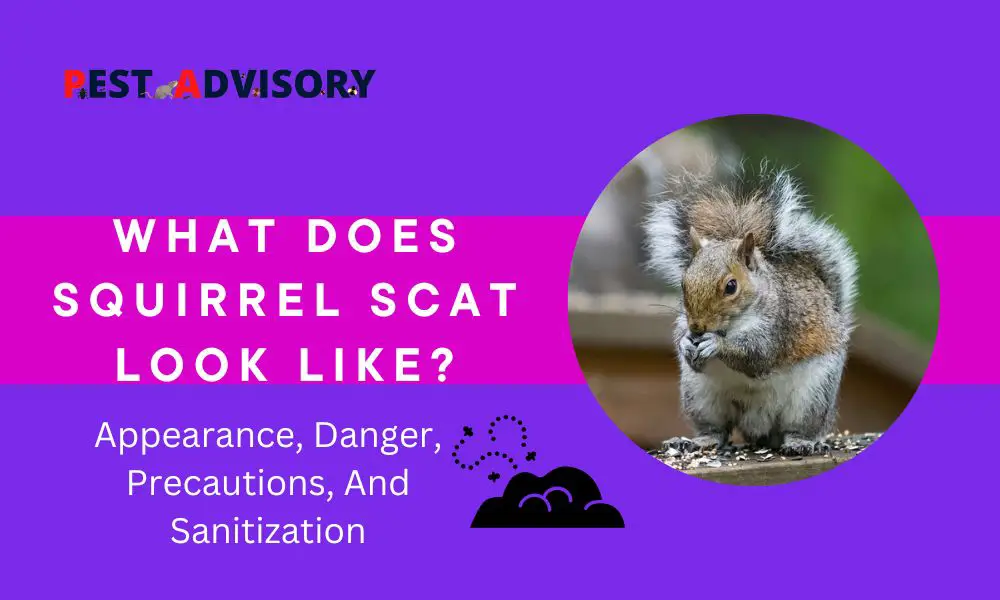If your house has recovered from squirrel infestation, do not be relieved just yet. Go and check your attic, terrace, and garden. You are bound to find large quantities of squirrel excreta.
Squirrel droppings are carriers of many harmful diseases. Do not let them go unacknowledged (even if they are in your yards) thinking they will get decomposed naturally.
It happens in the wild. But your suburban soils lack the agents required for rapid decomposition. As a result of which animal droppings when in contact with air for an extended period transmit air-borne diseases.
Important Note: If you're tired of pests and want a reliable solution, then you should definitely consider seeking help from a professional pest control company. DIY solutions can be effective, but if you're dealing with a significant pest infestation, you don't want to rely solely on DIY methods. Pest control companies typically don't charge huge fees. You can fill out this form to receive free quotes from the top local pest control companies, and compare the quotes and see for yourself. Then, finally, your pest problems will be eliminated for good.
To know about squirrel droppings, their dangers, and how to clean them up, read ahead!
What Does Squirrel Excreta Look Like?
If you are confused about what sort of infestation has plagued your house, one way is to be able to recognize their droppings. Squirrel droppings are not unique or anything. But knowing how they look can help.
- They are usually small seed or barrel-shaped pellet-like structures. They can be round or oval-shaped. It all depends on the age of squirrels and what they feed on.
- They are black or brown.
- They often have a smooth structure.
- The squirrel’s feces is around ½-1 inches long with varying thicknesses.
- Squirrel scats are always found in large quantities.
- Squirrel feces smell horrible. It stinks like rotten excreta combined with the pungent odor of ammonia in their urine. So you can imagine how foul the smell can get.
- Flies and other parasites along with larvae can gather around exposed feces. Sometimes eggs are also seen in squirrel scats.
Where can Squirrel Scat be Found?
Unlike rats who tend to have designated excreting spots where all members go to poop, squirrels have zero bathroom consciousness. They poop anywhere and everywhere. Be it in your garden, your attics, or on terraces, if there are squirrels, squirrel droppings can be found everywhere.
Harmful Effects of Squirrel Droppings
- The most common problem with having squirrel droppings around is that they tend to attract flies, ticks, and all kinds of other parasites that spread harmful diseases.
Squirrels can spread Diseases
Leptospirosis
Leptospirosis is a bacterial infection that can be spread through contact with squirrel urine or other bodily fluids. Symptoms of leptospirosis can include fever, headache, muscle aches, and vomiting, and in severe cases, the disease can cause kidney or liver failure.
Salmonellosis
Salmonellosis is another bacterial infection that can be transmitted through contact with squirrel feces or contaminated surfaces. Symptoms of salmonellosis can include diarrhea, fever, and abdominal cramps, and in some cases, the infection can be severe enough to require hospitalization.
Tularemia
Tularemia is a bacterial infection that is typically transmitted through the bite of an infected tick or deerfly, although it can also be spread through contact with contaminated animals, including squirrels. Symptoms of tularemia can include fever, headache, and muscle aches, and in severe cases, the disease can cause pneumonia or other serious complications.
Other Diseases
Other dangerous diseases include Lyme disease, and in very rare cases rabies, etc
The most dangerous disease spread by squirrel feces is roundworms. You can get infected even by breathing in squirrel roundworms. This can become fatal if left untreated.
To reduce the risk of contracting these or other squirrel-borne diseases, it’s important to take precautions when cleaning up squirrel scats or handling any other potentially contaminated materials.
If you suspect that you may have been exposed to a squirrel-borne disease, it’s important to seek medical attention right away. Many of these infections can be effectively treated with antibiotics, but prompt diagnosis and treatment are essential to prevent serious complications.
How to Clean Squirrel Droppings?
- Spray the squirrel excreta with disinfectant. Let it soak for 5 mins.
- Then using a paper towel pick up the feces and throw them in the garbage.
- Sanitize all the materials present around.
- Wash and sanitize your hands thoroughly.
- Wipe the floor with some disinfectant and bleach solution. If it is on the terrace, throw 3-4 large buckets of water over the areas.
Precautions
- Ensure that there are no more squirrels around.
- If you are planning to clear out squirrel droppings on your own, you will have to take strict preparations. You need to be ready with thick gloves made of rubber, latex, or vinyl. You should also wear a thick mask and cover up your hair and entire body. There should be no exposed area left.
- Secondly, you must open the windows and doors of the place so that the place is properly ventilated.
- Do not try to sweep or dust them out.
- Do not try to pick up squirrel scat with bare hands.

The importance of sanitizing areas where squirrels have been
Sanitizing areas where squirrels have been an important step in preventing the spread of diseases and reducing the risk of future squirrel infestations. Squirrels can leave behind urine, feces, and other materials that may be contaminated with bacteria, viruses, or other pathogens, and these materials can pose a health risk to humans and other animals.
To properly sanitize areas where squirrels have been, it’s important to wear gloves and other protective gear to avoid coming into direct contact with potentially contaminated materials. Begin by removing any visible droppings or debris, and dispose of these materials in a sealed plastic bag.
Next, use a disinfectant cleaner to thoroughly clean any surfaces that may have come into contact with squirrel droppings or other materials. This may include floors, walls, countertops, and other areas where squirrels may have been active.
After cleaning, allow the area to dry completely before using it again. This will help to ensure that any remaining bacteria or other pathogens have been eliminated, reducing the risk of future squirrel infestations and potential health risks.
Preventing Squirrels from Nesting near your Home
Squirrels can be persistent pests, and once they have established a nest near your home, it can be difficult to get rid of them. However, there are steps you can take to prevent squirrels from nesting in the first place.
One of the most important things you can do is to seal off potential entry points into your home. This may include filling in gaps around doors and windows, as well as repairing any damaged roof tiles or siding. Squirrels can fit through surprisingly small openings, so it’s important to be thorough in your efforts to seal off your home.
Another effective strategy is to use deterrents, such as motion-activated sprinklers or ultrasonic sound devices. These devices can help to keep squirrels away from your yard and may discourage them from nesting near your home.
You can also make your yard less appealing to squirrels by removing potential food sources, such as bird feeders or fallen fruit from trees. Keeping your yard clean and free of debris can also help to discourage squirrels from making themselves at home.
If you do find evidence of squirrels nesting near your home, it’s important to take action right away. Contacting a pest control professional can be an effective way to safely and humanely remove squirrels from your property and prevent them from causing further damage.
Identifying Other Types of animal droppings
Squirrel scats are not the only type of animal droppings that homeowners may encounter in their yards or homes. Other animals, such as raccoons, opossums, and skunks, may also leave droppings in residential areas, and it’s important to be able to identify these droppings in order to take appropriate action.
Raccoon Droppings
Raccoon droppings, for example, are often dark in color and can be up to three inches long. They may be found in areas where raccoons have been foraging for food, such as around trash cans or compost piles.
Opossum Droppings
Opossum droppings are typically smaller and more tapered than raccoon droppings, and they may be found in similar areas. Skunk droppings, on the other hand, may be more difficult to identify, as they can vary in size and shape depending on the animal’s diet.
It’s important to note that all animal droppings can carry bacteria and other pathogens, so it’s important to take precautions when cleaning them up. This may include wearing gloves and using disinfectant cleaners.
The importance of seeking professional help for Squirrel Infestations
While there are steps that homeowners can take to prevent squirrels from nesting near their homes and reduce the risk of health risks associated with squirrel activity, dealing with a squirrel infestation can be challenging and may require professional assistance.
Professional pest control companies have the experience and tools necessary to effectively and safely remove squirrels from homes and other structures. They can also help to identify and seal off potential entry points into your home, reducing the risk of future squirrel infestations.
Attempting to remove squirrels on your own can be dangerous and ineffective, as squirrels can be aggressive and may bite or scratch if they feel threatened. In addition, squirrels can cause significant damage to homes and other structures, including chewing through electrical wiring, insulation, and other materials.
By seeking professional help for squirrel infestations, homeowners can ensure that the problem is dealt with effectively and safely, minimizing the risk of damage to their property and the potential health risks associated with squirrel activity.
It’s important to choose a reputable pest control company with experience dealing with squirrel infestations. Look for a company with a track record of success and positive reviews from previous customers. The company should also use humane methods to remove squirrels, rather than relying on traps or other methods that may cause harm or suffering.
Final Words
Okay so now that you know about the diseases spread through squirrel scat, we hope you will be more careful.
Squirrel droppings are not to be taken lightly. It must be removed from living areas as soon as it is spotted. Doing it by yourself does not erase the risk chances. It is not easy or comfortable.
So if you see squirrels scat in or around your yard take immediate action or call in professional pest control.
Hope this article could answer your questions about squirrel droppings!

